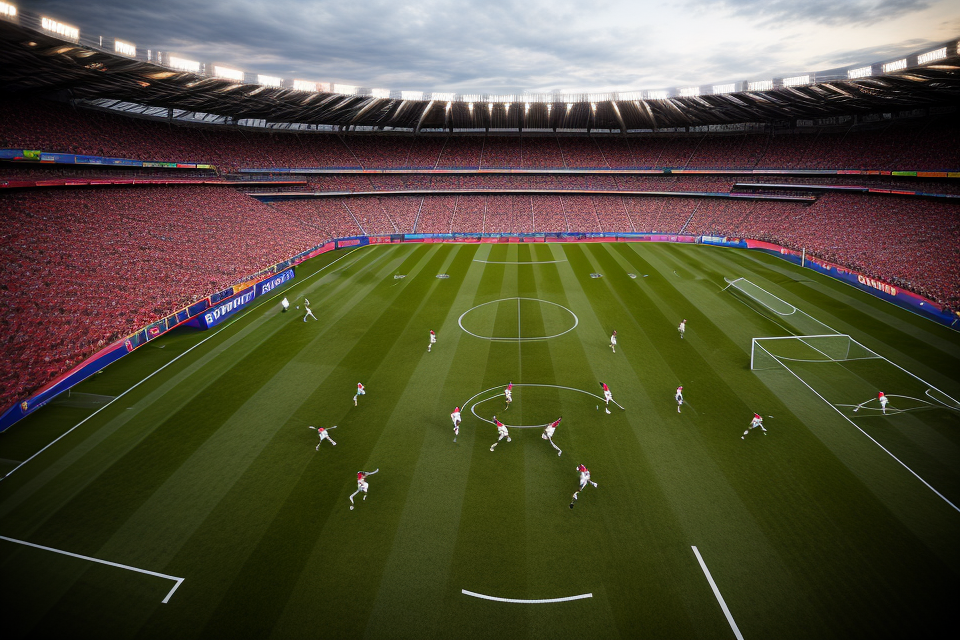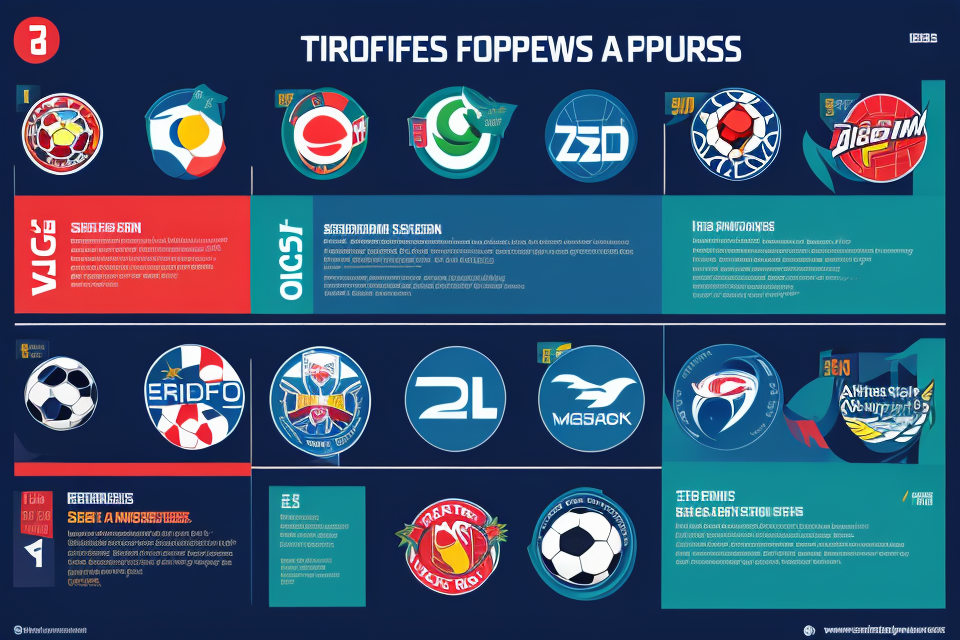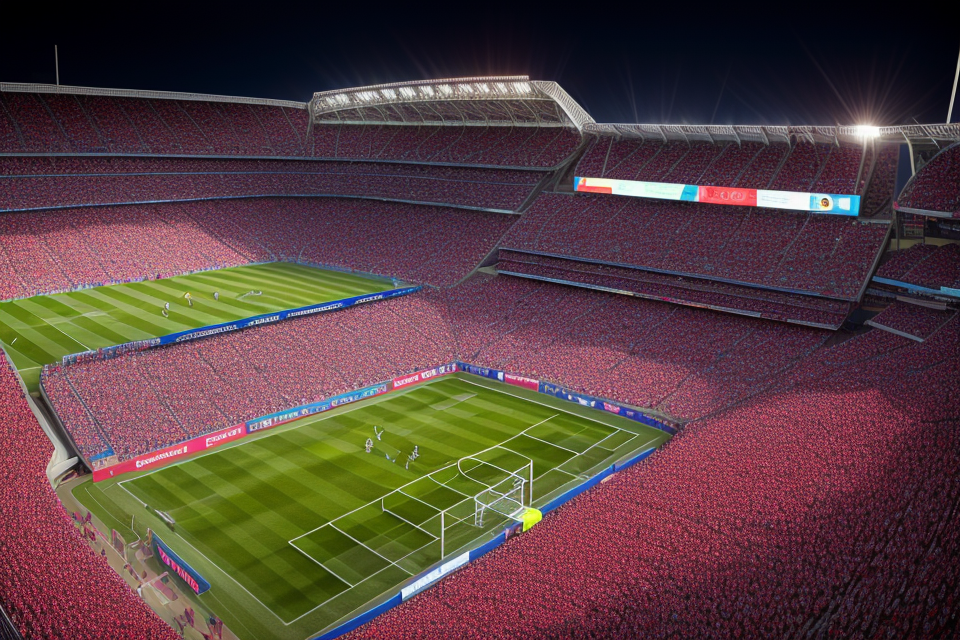The World Cup is the most prestigious tournament in international football, bringing together the best players from around the globe to compete for the coveted trophy. But can professional players really compete at this level? The answer is a resounding yes! Professional players, who have honed their skills through years of hard work and dedication, are more than capable of competing in the World Cup. In fact, many of the world’s top players are professionals, and they have proven time and time again that they have what it takes to excel on the biggest stage of all. So, whether you’re a fan of the national team or a die-hard supporter of a particular club, get ready to be captivated by the skills and passion of the world’s top professional players as they compete for football glory in the World Cup.
Yes, professional players can compete in the World Cup. In fact, the World Cup is one of the most prestigious tournaments in the world of football, and many professional players aspire to compete in it. The World Cup is organized by FIFA, the governing body of international football, and it is held every four years. The tournament features teams from all over the world, and it is a showcase of the best football talent from different countries. Professional players who play for their national teams are eligible to compete in the World Cup, and they often have the opportunity to represent their country on the biggest stage of all. The World Cup is a highly competitive tournament, and it attracts the best players from around the world, making it a truly global event.
Eligibility Criteria for the World Cup
FIFA Regulations
Amateur vs. Professional Status
In order to compete in the World Cup, players must meet certain eligibility criteria set forth by FIFA, the governing body of international soccer. One of the key requirements is that players must be registered with a national association, which is a member of FIFA. Additionally, players must meet the definition of an “amateur” or “semi-professional” status according to FIFA regulations.
FIFA defines an amateur player as someone who does not receive a salary or remuneration for playing soccer that is over and above the expenses incurred for training and competing. Semi-professional players, on the other hand, may receive a limited amount of compensation for their soccer-related activities, but the amount must not be their primary source of income.
Transfer Rules
Another important aspect of FIFA regulations for the World Cup is the transfer rules. Players must have the right to represent their national association, which is determined by the nationality of their birthplace, parents, or nationality at the time of their birth. Players can also change their national association if they meet certain criteria, such as having lived in a country for a certain period of time or having a parent or grandparent who was born in that country.
FIFA also has strict rules regarding the transfer of players between clubs. Players must be at least 18 years old to be transferred, and the transfer must be completed within the transfer window established by the national association. The transfer fee must also be paid in full before the player can compete for his new club.
In summary, the eligibility criteria for the World Cup set forth by FIFA require players to be registered with a national association and meet the definition of either an amateur or semi-professional status. Additionally, strict transfer rules must be followed in order for a player to be eligible to compete in the tournament.
National Team Regulations
The national team regulations for the World Cup dictate the eligibility criteria for players to represent their respective countries. These regulations vary depending on the country’s football association and its rules. The primary objective of these regulations is to ensure that players representing a national team have a strong connection with the country they are representing.
Residency Requirements
One of the primary factors considered in the national team regulations is the residency requirement. Most countries require players to have lived in the country for a specific period before they can represent the national team. This period can range from one to five years, depending on the country’s regulations. Players who have not lived in the country for the required period may still be eligible to play if they have parents or grandparents who were born in the country.
Age Limits
Another important factor considered in the national team regulations is the age limit. Most countries require players to be of a certain age before they can represent the national team. The age limit varies depending on the country’s regulations, but it is typically between 18 and 21 years old. Some countries also have provisions for players who are younger than the age limit but have exceptional talent and skill.
Citizenship
The national team regulations also consider the issue of citizenship. In some countries, players must have the citizenship of the country they represent. This means that players who have dual citizenship or multiple nationalities may not be eligible to represent a particular country’s national team. However, some countries allow players with dual citizenship to represent them if they meet other eligibility criteria.
Military Service
Some countries also have regulations that require players to complete a certain period of military service before they can represent the national team. This requirement is typically for players who are considered to be at the prime age for military service. However, this requirement is not universal and varies from country to country.
In summary, the national team regulations for the World Cup are in place to ensure that players representing a country’s national team have a strong connection with the country. These regulations consider factors such as residency requirements, age limits, citizenship, and military service. The specific regulations vary depending on the country’s football association and its rules.
The Path to the World Cup
Qualification Process
The road to the World Cup is a long and grueling one, requiring a great deal of skill, talent, and determination. To qualify for the tournament, teams must first compete in a series of regional tournaments, where they will face off against other teams from their respective regions. These tournaments are typically held over the course of several months, and involve a series of matches played against a variety of opponents.
In addition to these regional tournaments, teams may also participate in international friendly matches, which are non-competitive matches played against other national teams. These matches are often used as an opportunity for teams to prepare for upcoming tournaments, and to try out new strategies and tactics.
Overall, the qualification process for the World Cup is a highly competitive and demanding one, requiring teams to be at the top of their game if they hope to make it to the tournament. Only the best teams from around the world will have the opportunity to compete in the World Cup, and the journey to get there is one that requires a great deal of hard work, dedication, and talent.
Player Selection
Coach’s Discretion
In most cases, the coach of a national team has the final say in selecting players for the World Cup. The coach is responsible for assembling a team that they believe has the best chance of winning the tournament. They will consider a range of factors, including a player’s form, fitness, and overall ability, when making their selections.
Coaches may also take into account a player’s experience at the World Cup, as well as their ability to work well with other players in the team. They may also consider a player’s tactical versatility, as well as their ability to perform under pressure.
In some cases, the coach may be under pressure from fans and the media to select certain players, but ultimately it is their responsibility to make the decisions that they believe will give the team the best chance of success.
Fan Expectations
Fans of a national team will often have their own opinions on which players should be selected for the World Cup. They may have their favorite players who they believe should be included in the squad, or they may have concerns about certain players’ form or fitness.
However, it is important for fans to remember that the coach is responsible for selecting the team, and their decisions should be respected. While fans may not always agree with the coach’s selections, it is important to trust that they have the best interests of the team at heart.
Fans can also play a role in player selection by supporting their team and creating a positive atmosphere at games. This can help boost the players’ confidence and give them the support they need to perform at their best. Ultimately, it is up to the coach to make the final decisions on player selection, but fans can play a role in creating a positive environment for the team.
The Benefits of Participating in the World Cup
Career Advancement
Competing in the World Cup can be a significant opportunity for professional players to advance their careers. Here are some of the ways in which participating in the World Cup can help players achieve their goals:
Increased Exposure
The World Cup is one of the most-watched sporting events in the world, with billions of people tuning in to watch the games. Playing in the World Cup can give players the opportunity to showcase their skills to a global audience, which can help them attract the attention of scouts, agents, and potential employers. In addition, players who perform well in the World Cup are likely to receive more media coverage and endorsement opportunities, which can further boost their careers.
Improved Skills
Playing in the World Cup can also help players improve their skills and knowledge of the game. They will have the opportunity to play against some of the best players in the world and learn from their techniques and strategies. Additionally, they will gain valuable experience playing in high-pressure situations, which can help them become more resilient and adaptable in future matches. Finally, players who compete in the World Cup may have access to better training facilities and coaching, which can help them improve their overall performance.
National Pride
Participating in the World Cup offers professional players the opportunity to represent their country and experience a sense of national pride. This pride stems from the opportunity to wear the national team jersey and compete on the international stage, as well as the potential to bring the country together through sport.
Representing the Country
When professional players are selected to play for their national team, they are representing not only themselves but also their country. They are expected to uphold the values and standards of their nation, and to showcase their skills and abilities on the international stage. For many players, this is a once-in-a-lifetime opportunity, and one that they take great pride in.
Uniting the Nation
The World Cup has the power to unite a nation like no other event. When a national team competes in the tournament, fans from all walks of life come together to support their team. The players become symbols of national pride, and their success on the field can bring a country together in a way that little else can. For professional players, the opportunity to play in the World Cup and contribute to this sense of national unity is a truly special experience.
Challenges Faced by Professional Players in the World Cup
High Level of Competition
The World Cup is considered the pinnacle of international football, and it is not uncommon for professional players to feel the pressure of competing at such a high level. The level of competition in the World Cup is extremely high, and professional players must be prepared to face some of the best players in the world.
One of the main challenges faced by professional players in the World Cup is the high level of competition. The level of competition in the World Cup is significantly higher than in any other international tournament or domestic league. Professional players must be prepared to face teams and players who are equally skilled, if not more so, than themselves.
The physical and mental demands of the World Cup are also a significant challenge for professional players. The World Cup is a highly intense and physically demanding tournament, and players must be in top physical condition to compete at the highest level. Additionally, the mental pressure of playing in the World Cup can be overwhelming, and players must be mentally tough to handle the pressure and perform at their best.
Another challenge faced by professional players in the World Cup is adapting to different playing styles. The World Cup features teams from all over the world, each with their own unique playing style. Professional players must be able to quickly adapt to different playing styles and be able to effectively execute the strategies of their team.
Overall, the high level of competition in the World Cup is a significant challenge for professional players. Players must be prepared to face some of the best players in the world, be in top physical condition, and be mentally tough to handle the pressure of the World Cup. Additionally, players must be able to quickly adapt to different playing styles and be able to effectively execute their team’s strategies.
Pressure and Expectations
The World Cup is the pinnacle of international football, and for professional players, it is a stage where they are expected to perform at their best. However, the pressure and expectations that come with competing in the World Cup can be overwhelming for even the most experienced players.
Media Attention
The World Cup is one of the most-watched sporting events in the world, and as such, it attracts a lot of media attention. Professional players are constantly bombarded with questions from journalists and are expected to provide insightful answers. The media scrutiny can be intense, and players must be prepared to handle it.
Moreover, every move that professional players make during the World Cup is captured by cameras and broadcasted to millions of viewers worldwide. This means that players must be aware that their every action is being watched and analyzed by fans and critics alike.
Fans are the lifeblood of any sport, and football is no exception. Fans are passionate about their teams and players, and they have high expectations for their team’s performance in the World Cup. Professional players must be prepared to deal with the pressure of fan expectations, which can be overwhelming.
Fans expect professional players to perform at their best, and they are quick to criticize players who underperform. Players must be able to handle the pressure of fan expectations and use it to motivate themselves to perform better.
Additionally, fans expect professional players to represent their country with pride and honor. Players must be aware of the responsibility that comes with representing their country and must be prepared to give their best effort.
Overall, the pressure and expectations that come with competing in the World Cup can be overwhelming for professional players. However, players who are able to handle the pressure and expectations are often rewarded with success on the field.
Balancing Professional and International Career
Managing Workload
Load Management
Professional players competing in the World Cup face a unique challenge in balancing their club duties with international commitments. Managing their workload is crucial to avoid burnout and injuries. Load management is a critical aspect of maintaining peak performance throughout the season.
Here are some strategies that players and coaches use to manage their workload:
- Resting key players during certain matches: This is a common practice among top clubs, especially in domestic leagues. Coaches will often rest their key players during less important matches to keep them fresh for crucial games.
- Rotating the squad: This involves giving playing time to other players, allowing key players to rest and recover. Coaches often rotate the squad to avoid overworking their key players and prevent injuries.
- Increasing squad depth: To manage workload, clubs invest in squad depth. Having a strong squad with quality players in each position allows coaches to rotate the squad and keep key players fresh.
- Pre-season preparation: Clubs will often adjust their pre-season preparation to accommodate international competitions. This may involve shorter pre-season tours or lighter training schedules to allow players to return to their clubs in good shape.
- Player load monitoring: Coaches and fitness staff monitor the load on each player to avoid overtraining and injuries. They track the number of matches played, minutes played, distance covered, and other performance indicators to manage player workload.
- Listening to players: Communication between players and coaches is crucial to managing workload. Players need to communicate their physical and mental state to the coaches, who will then adjust their training and matchday squad accordingly.
Overall, managing workload is essential for professional players competing in the World Cup. By implementing effective load management strategies, players can maintain their peak performance throughout the season and avoid injuries.
Maintaining Form
Continuity in Club Play
Professional players participating in the World Cup must ensure continuity in their club play to maintain their form. This involves regularly training and playing with their club teams during the international breaks to stay in shape and maintain their match fitness. This is crucial as the World Cup is a highly competitive tournament that requires players to be at their best both physically and mentally.
Individual Training
In addition to continuity in club play, maintaining form also requires individual training. Players must focus on their individual strengths and weaknesses and work on improving their skills and techniques. This can involve working with personal trainers, fitness coaches, and nutritionists to create a tailored training program that suits their individual needs.
Players must also manage their time effectively to balance their professional and international careers. This involves creating a schedule that allows them to train and play for their club teams while also representing their country in international competitions.
Moreover, players must be aware of their physical and mental limitations and manage their workload accordingly. This involves avoiding overtraining and ensuring they have enough rest and recovery time between matches and training sessions.
Overall, maintaining form is essential for professional players participating in the World Cup. It requires a combination of continuity in club play, individual training, and effective time management to balance their professional and international careers.
Recap of Key Points
Eligibility Criteria
The eligibility criteria for professional players to compete in the World Cup are determined by the governing body of each sport. In soccer, for example, players must be eligible to represent their national team according to FIFA’s rules and regulations.
Benefits and Challenges
Professional players who compete in the World Cup can benefit from increased exposure, the opportunity to represent their country, and the potential to win a prestigious title. However, they may also face challenges such as managing their professional and international careers, balancing training and competition schedules, and dealing with the physical and mental demands of competing at a high level.
Balancing Professional and International Career
Professional players who wish to compete in the World Cup must balance their professional and international careers. This involves managing their time and energy, making decisions about which competitions to prioritize, and communicating with their clubs and national teams to ensure that they are able to perform at their best. Many players also seek the guidance of agents, coaches, and other experts to help them navigate the complexities of their careers and make informed decisions about their future.
Final Thoughts
The question of whether professional players can compete in the World Cup has been a topic of debate for many years. While there are many advantages to allowing professional players to participate, there are also some potential drawbacks. In this section, we will explore some final thoughts on the topic.
Future of Professional Players in the World Cup
One of the biggest advantages of allowing professional players to compete in the World Cup is that it would give them the opportunity to showcase their skills on a global stage. This could lead to increased exposure and more opportunities for these players, both in terms of their professional careers and their international careers.
However, there are also some potential drawbacks to consider. For example, some people argue that allowing professional players to compete in the World Cup could lead to a decrease in the quality of play. This is because many professional players are focused on their club teams and may not be as committed to their national teams as they would be if they were amateurs.
Another potential drawback is that allowing professional players to compete in the World Cup could lead to a decrease in the number of opportunities for amateur players. This is because many of these players may not be able to compete at the same level as the professionals, and as a result, they may not be given the same opportunities to showcase their skills.
Impact on Soccer as a Whole
Overall, the decision of whether to allow professional players to compete in the World Cup is a complex one. While there are certainly some advantages to doing so, there are also some potential drawbacks that must be considered. Ultimately, the decision will depend on a variety of factors, including the goals of the international soccer community and the needs of the players themselves.
In terms of the impact on soccer as a whole, it is clear that the sport is becoming increasingly professionalized. This means that the line between professional and amateur soccer is becoming more and more blurred, and it is likely that this trend will continue in the future. As a result, it is important for the international soccer community to carefully consider the implications of allowing professional players to compete in the World Cup, and to make a decision that is in the best interests of the sport as a whole.
FAQs
1. Can professional players compete in the World Cup?
Yes, professional players can compete in the World Cup. In fact, the World Cup is one of the most prestigious international tournaments in soccer, and many professional players dream of participating in it. However, it’s important to note that only players who are registered with their national federation are eligible to play for their country in the World Cup.
2. How old do players have to be to compete in the World Cup?
Players must be at least 21 years old to compete in the World Cup. However, there is no upper age limit. Some players continue to compete well into their 30s and even 40s.
3. Can players from any country compete in the World Cup?
No, players can only compete in the World Cup if they are registered with their national federation. Each country has its own national federation, which is responsible for overseeing soccer in that country and selecting players to represent the country in international competitions like the World Cup.
4. How are players selected to compete in the World Cup?
Players are selected to compete in the World Cup by their national federation. Each federation has its own selection process, which may involve factors such as a player’s performance in domestic leagues, international competitions, and other factors. Some federations may also hold trials or invite players to training camps to evaluate their skills.
5. Can players from different teams play on the same team in the World Cup?
No, players can only play for their national team in the World Cup. The World Cup is a national team competition, which means that players must represent their country of birth or nationality. There is no provision for players to switch teams or play for a different country in the World Cup.



